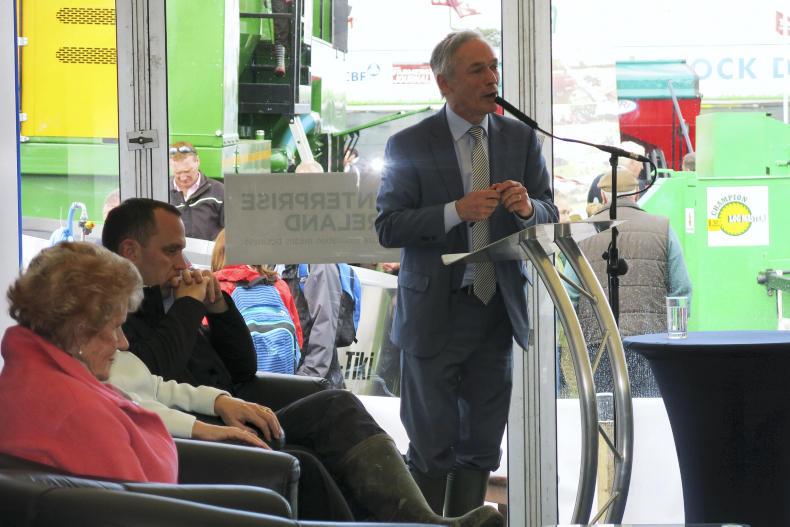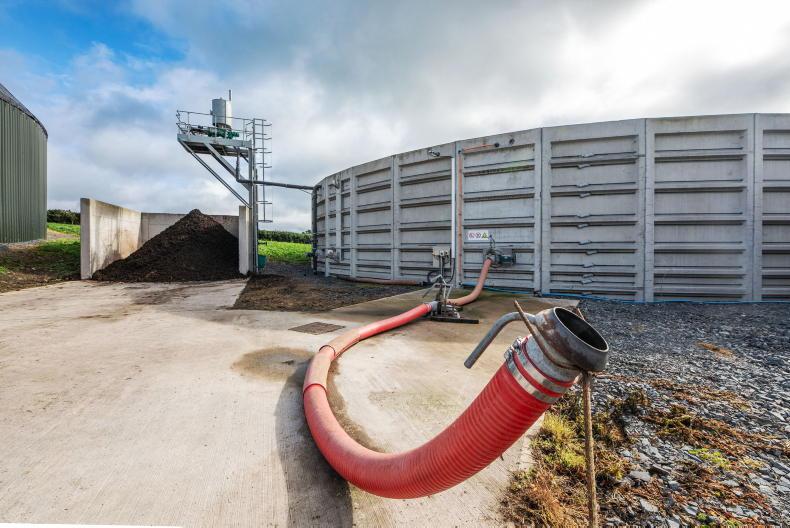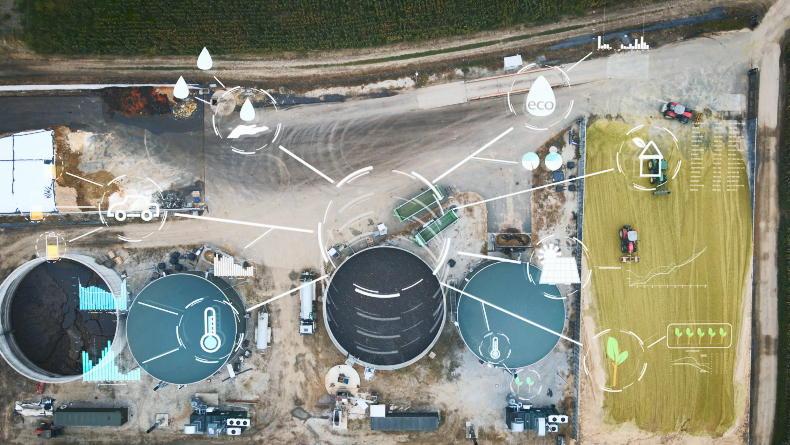Whether they want to grow energy crops, digest slurry and grass into biogas or install solar panels and wind turbines, farmers remain constrained by the lack of Government support, especially when compared with other EU countries.
This is despite a recognition by new Minister for Communications, Climate Action and Environment Richard Bruton that “we need to do more if we are to meet our obligations” and produce 16% of Ireland’s energy from renewables by 2020 – which was only 11% last year.
“As minister, I am determined to review the current policy tools in place and address the gaps that exist to get us back on track,” Minister Bruton told the Irish Farmers Journal, with an overall Government climate plan due by the end of this year.
Concretely, several support schemes are making progress and will soon open for applications.
The Support Scheme for Renewable Heat is now open for heat pump grants only, and is awaiting State aid clearance from the European Commission to open for biomass and biogas boilers or combined heat and power generators.
“A key priority for me is to open the next phase of the Support Scheme for Renewable Heat, which will support biomass and anaerobic digestion heating systems,” Minister Bruton said.
While they await the green light from Brussels in late 2018 or early 2019, officials at the Sustainable Energy Authority of Ireland (SEAI) are preparing the terms and conditions of tariff payments of up to 5.66c/kWh for users of biomass and biogas.
The requirements will be similar to those already known for heat pumps, such as the energy efficiency criteria for the buildings to be heated.
Once the scheme opens, big agricultural users of heat such as pig, poultry or horticulture farms can apply for the payments for 15 years and farmers can hope to see demand for energy crops and wood biomass from customers such as hotels and factories.
Electricity
The Renewable Electricity Support Scheme approved by Government in July is being finalised and will hold its first auction in 2019.
As the Government scrambles to meet 2020 targets, large wind farms with planning permission and grid connections ready to come online quickly are expected to be prioritised.
However, “this scheme is currently being designed and will support community participation in and benefit from renewable electricity projects”, Minister Bruton said.
Regardless of financial support, obtaining a grid connection from the ESB for farm-scale projects such as the conversion of a group of fields into a solar farm remains a major bottleneck.
There is hope that some funding will be ringfenced here to support micro-generation – rooftop or individual wind turbines ideal for self-consumption on a farm, with an option for the producer to inject excess power into the grid and pay only for the net amount of electricity they purchase.
This is currently an option in many EU contries, but not in Ireland.
While pig and poultry farms are eligible for TAMS grants for photovoltaic panels, there have been widespread calls to extend this to other agricultural sectors.
Dairy farms could benefit from solar electricity stored in batteries for use at milking and cooling times, and horticulture farms are large energy users with roof space too.
Climate fund
The Government’s €500m Climate Action Fund awarded its first round of funding last month. Of the €77m allocated so far, €9m went to Gas Networks Ireland’s Mitchelstown, Co Cork-based project to inject biogas from around 20 farm-based anaerobic digesters into the national network.
The next rounds of funding may include more farm renewable projects. Meanwhile, smaller local initiatives have recently received European Innovation Partnerships funding through the Department of Agriculture.
These include demonstration small biogas plants to be developed by the Irish BioEnergy Association.
Renewable Energy Directive
At EU level, the second Renewable Energy Directive passed by MEPs last month will come into force shortly, giving member states 18 months to improve their legislation and make it easier for farmers and other citizens to produce their own electricity. It will also increase the EU target to 32% of all energy from renewables by 2030.
Read more
Questions and answers on the renewable heat scheme
Local farming projects receive €10m in funding
New EU legislation to facilitate farm-level renewables
Whether they want to grow energy crops, digest slurry and grass into biogas or install solar panels and wind turbines, farmers remain constrained by the lack of Government support, especially when compared with other EU countries.
This is despite a recognition by new Minister for Communications, Climate Action and Environment Richard Bruton that “we need to do more if we are to meet our obligations” and produce 16% of Ireland’s energy from renewables by 2020 – which was only 11% last year.
“As minister, I am determined to review the current policy tools in place and address the gaps that exist to get us back on track,” Minister Bruton told the Irish Farmers Journal, with an overall Government climate plan due by the end of this year.
Concretely, several support schemes are making progress and will soon open for applications.
The Support Scheme for Renewable Heat is now open for heat pump grants only, and is awaiting State aid clearance from the European Commission to open for biomass and biogas boilers or combined heat and power generators.
“A key priority for me is to open the next phase of the Support Scheme for Renewable Heat, which will support biomass and anaerobic digestion heating systems,” Minister Bruton said.
While they await the green light from Brussels in late 2018 or early 2019, officials at the Sustainable Energy Authority of Ireland (SEAI) are preparing the terms and conditions of tariff payments of up to 5.66c/kWh for users of biomass and biogas.
The requirements will be similar to those already known for heat pumps, such as the energy efficiency criteria for the buildings to be heated.
Once the scheme opens, big agricultural users of heat such as pig, poultry or horticulture farms can apply for the payments for 15 years and farmers can hope to see demand for energy crops and wood biomass from customers such as hotels and factories.
Electricity
The Renewable Electricity Support Scheme approved by Government in July is being finalised and will hold its first auction in 2019.
As the Government scrambles to meet 2020 targets, large wind farms with planning permission and grid connections ready to come online quickly are expected to be prioritised.
However, “this scheme is currently being designed and will support community participation in and benefit from renewable electricity projects”, Minister Bruton said.
Regardless of financial support, obtaining a grid connection from the ESB for farm-scale projects such as the conversion of a group of fields into a solar farm remains a major bottleneck.
There is hope that some funding will be ringfenced here to support micro-generation – rooftop or individual wind turbines ideal for self-consumption on a farm, with an option for the producer to inject excess power into the grid and pay only for the net amount of electricity they purchase.
This is currently an option in many EU contries, but not in Ireland.
While pig and poultry farms are eligible for TAMS grants for photovoltaic panels, there have been widespread calls to extend this to other agricultural sectors.
Dairy farms could benefit from solar electricity stored in batteries for use at milking and cooling times, and horticulture farms are large energy users with roof space too.
Climate fund
The Government’s €500m Climate Action Fund awarded its first round of funding last month. Of the €77m allocated so far, €9m went to Gas Networks Ireland’s Mitchelstown, Co Cork-based project to inject biogas from around 20 farm-based anaerobic digesters into the national network.
The next rounds of funding may include more farm renewable projects. Meanwhile, smaller local initiatives have recently received European Innovation Partnerships funding through the Department of Agriculture.
These include demonstration small biogas plants to be developed by the Irish BioEnergy Association.
Renewable Energy Directive
At EU level, the second Renewable Energy Directive passed by MEPs last month will come into force shortly, giving member states 18 months to improve their legislation and make it easier for farmers and other citizens to produce their own electricity. It will also increase the EU target to 32% of all energy from renewables by 2030.
Read more
Questions and answers on the renewable heat scheme
Local farming projects receive €10m in funding
New EU legislation to facilitate farm-level renewables










SHARING OPTIONS